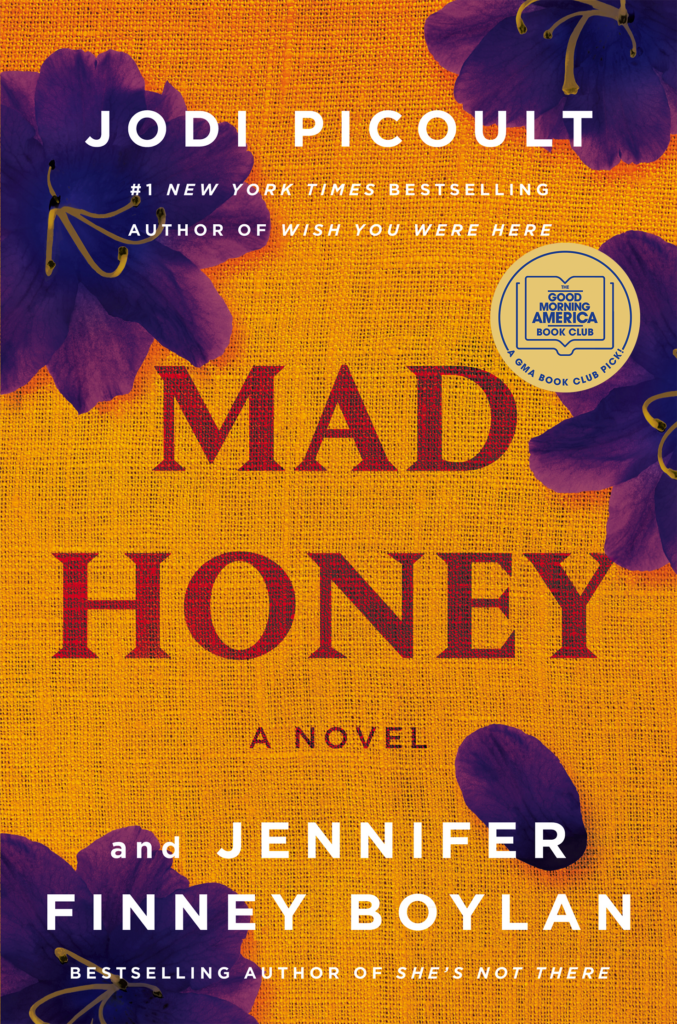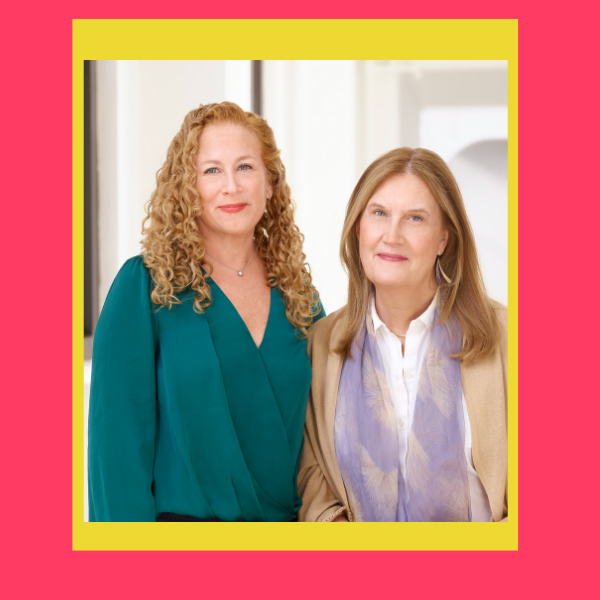The novel Mad Honey by Jodi Picoult and Jennifer Finney Boylan is a page-turner that meets societal conversations with the stillness of small-town New England. Olivia is the mother of a child accused of murdering his girlfriend. Told from multiple timelines and perspectives, every character has agency and secrets that they cannot run from. I liken Mad Honey to Defending Jacob meets The Secret Life of Bees.
My interview with Jodi and Jennifer asked how did they care for themselves while writing, what they wanted the characters to inherit, collaboration as authors, and music for a buzzing playlist.
CW: murder, physical abuse, verbal abuse, death, suicide, trans violence
Interview with Jodi Picoult and Jennifer Finney Boylan
Ashley Paul (AP): What are your definitions of feminism?
Jodi Picoult (JP): To me, feminism is the practice of reducing gender discrimination and making sure women — ALL women, cisgender and trans — have access to traditionally male spaces and are given a voice.
Jennifer Finney Boylan (JFB): It’s also the right to autonomy over your own body, to make your own choices about who you are and the life you want to live. Which is another way of saying that the fight for trans rights is not so different from the right to choose. It is about having the freedom to live your life with courage and grace without some Neanderthal stepping in to tell you he knows who you are better than you do your own self.
AP: Olivia continues to nurture as an apiarist after her father has passed on. What did you want the characters to inherit as they moved in this story?
JP: Agency — sometimes not inherited, but grown from scratch (kind of like the way Olivia would start a new hive if an old one is decimated by a bear). I wanted the two women in this story to realize that they are not defined by their past selves.
JFB: In so many ways this is the question that haunts me, in all my work. Are we now the people we have been? Everyone deserves the right to live her own life full measure. But the past—whether joyful or traumatic—continues to affect us, every day. What do we owe the people we love, in terms of telling them about our younger selves. If I had an abortion as a teenager, do I have to tell my lover about that now? What is the difference between what is secret, and what is private?
AP: How does this novel carry societal conversations we are having, especially as teenagers are involved, and as you all are advocates?
JP: As a cisgender author, it’s important to me that books by trans writers like Jenny are on the shelves, so teens that are trans can see themselves represented in mainstream media. But additionally, fiction has a remarkable stealth weapon — you get people hooked on the characters and the plot and by the time they’re done, they’ve learned something by accident. The hope is for Mad Honey to give primarily cisgender people the tools and vocabulary to have a conversation about trans rights, and to recognize that trans issues are not issues — they are the lives of human beings.
JFB: When I came out as trans over 20 years ago, I told everyone I was not an activist; I was just a storyteller. And that has largely been my business in the 21st century: I have tried to tell tales that I think are interesting, or inspiring, or heartbreaking, each according to its lights. But what I have learned is that storytelling IS activism. When you create a character, with any luck the reader might fall in love with that character, and see them, first and foremost not as the embodiment of an “issue,” but as a human being.

AP: The emotions of the story will catapult the reader for a page-turner. How did you care for yourselves while writing this story?
JP: I think I’ve gotten used to going on the roller coaster! For me, writing Olivia, I was very able to separate myself from her. My home life, and more importantly my husband, is thankfully very different from hers with Braden.
JFB: I really appreciate this question. Because I can tell you— especially as someone who generally writes non-fiction, and mostly tells stories from her own life—that this work can sometimes be harrowing. It has taken a toll on me, particularly as trans issues have become the leading edge of conversations, on both the right and left, about whether or not I have the right to exist according to my own heart. I don’t think I’m always great at taking care of myself. But fortunately I’m surrounded by people who love me—including Deirdre, my wife of 34 years: 12 as husband and wife, and 22 (so far) as wife and wife. As for me, I like to take a lot of long walks in the woods near my house in Maine. And I make a lot of pizza in my outdoor fire oven. Pizza is pretty good for the soul.
And I should also say that as far as Mad Honey is concerned, Jodi Picoult has been pretty good at looking out for me. Like me, she gets tons of hate mail every day. And so, better than most writers, I think Jodi knows the toll this work can exact, and is very good at reaching out and giving me, for instance, a really nice piece of chocolate.
AP: In the author’s notes, there is an elaboration on your collaboration for this novel. How did you become more informed about your work as an author through collaboration?
JP: Often when we write we do not analyze HOW we write, we just do it. I learned that my process for creating is very different from Jenny’s. Neither is wrong or right — it’s just different. I craft a lot in my head and put down on paper something that is already a confident start. Jenny crafts through drafts. We had to learn how to balance those two different styles.
JFB: We really do write in different ways. I will sing the praises of revision, and not only on the page. Each of us is only a draft of the person we might yet become, and who can say when that work will be complete? But it is never too late to become yourself. Every last soul on earth deserves a new chance, and a fresh page.
AP: What songs would you put on a playlist based on the female divas the queen bees are named after?
JP: What a great question! Break My Soul and Formation and Run the World by Beyoncé, When we Were Young and Make You Feel my Love and All I Ask by Adele, Thank U Next and Bang Bang by Ariana Grande, Born This Way and The Queen and Bad Romance by Gaga, I Will Always Love You by Whitney Houston, Always Be My Baby and Honey by Mariah Carey, Oops I Did It Again and Toxic by Britney Spears, RESPECT and You Make Me Feel Like a Natural Woman by Aretha Franklin, Betty and the 1 and All Too Well by Taylor Swift, Titanium by Sia, I’ll Never Love This Way Again by Dionne Warwick, Believe by Cher, The One That Got Away and Teenage Dream by Katy Perry. (Now I want someone to create this playlist.)
JFB: That’s really a question for Jodi, since she’s the one who wrote (almost) all of the beekeeping stuff. But I would also like to make the case for Mozart’s 20th piano concerto, particularly the second movement, the “Romanze.” Also, the Grateful Dead’s Terrapin Station suite has always lifted my spirits, especially the conclusion: “Inspiration! Move me brightly! Light the song with sense and color that holds away despair.” That song also speaks of a hope for a future—, when “things we’ve never seen will seem familiar.” I am hoping that Mad Honey brings us closer to that future.
Editor’s Note – We did create the playlist! It’s a vibe. What songs would you add?
7) What organizations would you like to amplify to our audience?
JP: I’d like to shout out the National Domestic Violence Hotline (800-799-7233), and also The Trevor Project and Black Trans Advocacy and the Transgender Legal Defense & Education fund. I also really love the NYT Transgender Lives: Your Stories interactive project (of which Jenny is a contributor!)
JFB: I was on the board of directors of GLAAD for 7 years, 4 of them as that organization’s national chair. Glaad.org is the nonprofit dedicated to changing the culture around LGBTQ issues through the media. And right now I’m a Trustee of PEN America, which fights for freedom of expression, and the freedom to read, around the world and in this country. We work to free imprisoned authors. And we fight against book bans. More books are banned in this country every day by people who don’t want readers’ hearts to open. Many of the books being banned right now are written by Jodi Picoult. So yeah: you could say this work is highly personal. But, as my mother used to say, “Love will prevail.”
Thank you, Jodi and Jennifer, for speaking to us about Mad Honey.


